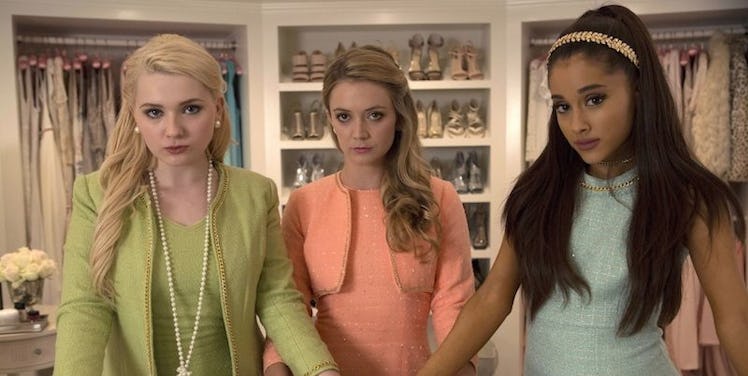
What To Expect From The Premiere Of Ryan Murphy's 'Scream Queens'
Tonight on Fox, Ryan Murphy's (of "Glee" and "American Horror Story" fame) new epic gore-fest hits the small screen with a very bloody, two-hour series premiere.
To get you primed for all the slasher suspense, here are all the deets so you know what you're getting into tonight. Emma Roberts, Ariana Grande, Lea Michele, Abigail Breslin and Jamie Lee Curtis star in this black comedy take on the slasher genre.
Oh, and for some reason, Nick Jonas makes an appearance as a (small spoiler alert) gay, closeted, possibly devious frat boy in tacky patterned golf pants. You have to tune in, if only to see how THAT plot line plays out.
A newcomer you may not be familiar with, Skyler Samuels ("The DUFF"), stars as our heroine, Grace. She's an upbeat, quirky misfit raised by her widowed dad (Oliver Hudson).
Grace ventures into Wallace University as a bright-eyed, incoming freshman, where she dreams of pledging Kappa Kappa Tau, the sorority her deceased mother was in during her college days.
Little does Grace know, Kappa is now run by "C-U Next Tuesday" Chanel (Roberts) and her sycophantic minions known only as Chanels 2-5.
In the hands of Chanel, Kappa has ventured far away from the welcoming sisterhood Grace was expecting, and has become relentlessly exclusionary, full of body-shaming and hazing. It is a place where all-around toxicity thrives.
It's toxic in the sense that Chanel's Kappa breeds an environment where women compete with, demean and sabotage one another, as opposed to having a sorority be a feminist environment where women protect and support one another in the face of adversity and misogyny.
Of course, this type of toxicity is not unique to Chanel or the fictional Kappa at Wallace University.
Murphy's representation of Chanel and Kappa is a pretty clear critique of sorority culture and Greek life in general, as well as a critique of the tendency for women to participate in undermining behavior against their own "friends."
Never without their pearls or pastel business suits (no matter the time of day), the ladies of Kappa make every day on campus feel like an Easter Sunday brunch at a (very exclusive and presumably all white) country club.
That is, until Dean Munsch, played by OG scream queen Jamie Lee Curtis ("Halloween"), steps in and issues a fatwa on all of Kappa's exclusionary, demeaning practices.
Dean Munsch declares that Kappa must accept any girl who pledges, leaving a horrified Chanel with only the campus "dregs," which include the aforementioned Grace, sassy roommate Zayday, a tattooed lesbian who serves as the only voice of feminist reason, a hard-of-hearing Taylor Swift wannabe and Hester (Lea Michele), who Chanel will refer to only as "neck brace."
Because she, you know, wears a neck brace.
In an effort to rid illustrious Kappa of its new misfit pledge class, Chanel goes to some extreme measures. Accidents happen; shenanigans ensue.
Complicating all of this are the mysterious events of 20 years earlier, as seen in a flashback to the era of TLC's "Waterfalls," where a Chanel-like bitch rules Kappa with a lace-gloved fist.
Does what happened in 1995 in Kappa house have anything to do with the creep in a latex red devil costume (in an ode to season one of "American Horror Story") who has been stalking the Kappas?
Hmm, we'll have to wait and see what that connection may be.
For now, there are tons of other questions: Who loses their head in a hazing accident gone wrong? What's the deal with Nick Jonas? Who can Grace trust? If there's a connection to the past, who's in on it?
The premiere sets pretty much everyone up as a possible conspirator, leaving several loosely dangling plot lines that could go anywhere.
This is kind of what a Ryan Murphy series tends to do: go in a thousand different directions, leaving the main conflict a miserable mess of confusion and unidentifiable body parts.
Maybe that's what some viewers love about "Glee" and "AHS." There's definitely the feeling that anything can happen at any time.
But in the long run of the series, this habit of deluging the viewer with dozens of bloody tangents only serves to diminish the impact of the main narrative, blurring the true themes of the series.
This is a shame because the stories Murphy tries to tell could be powerful in fomenting a mass social paradigm shift on some important social issues. Time and again, Murphy's work shows those on the wrong side of history getting their punishment, which is a powerful message.
Now, imagine how much more powerful such a message would be if the narrative surrounding it was more cohesive and concise.
As it stands, "Scream Queens" is full of snarky bite and laugh-out-loud one-liners.
You might want to run Chanel's head over with a lawnmower, but damn, she's full of banging zingers.
And, even in all its snarkiness and pithy pop-culture references, "Scream Queens" still manages to pack in that characteristic Murphy message: Ladies, stop watching "Mean Girls" marathons and start f*cking just being nice to one another.
Oh, and stop chasing narcissistic douches too. That's a great message for the young women of the world to soak in.
But let's just hope that in all the stalking, slashing and literal back-stabbing, the ultimate message about the dangers of metaphorical back-stabbing doesn't get lost along the way.